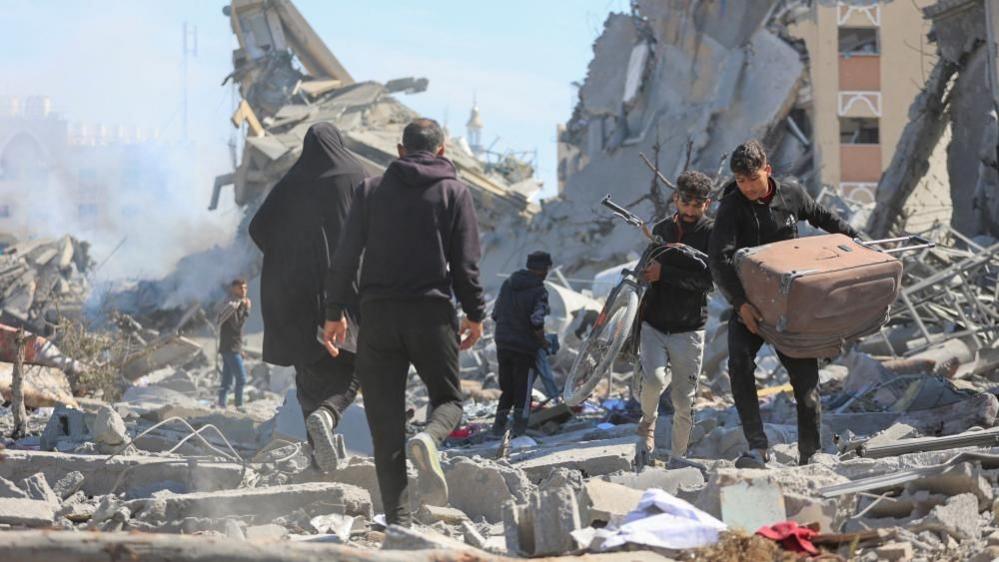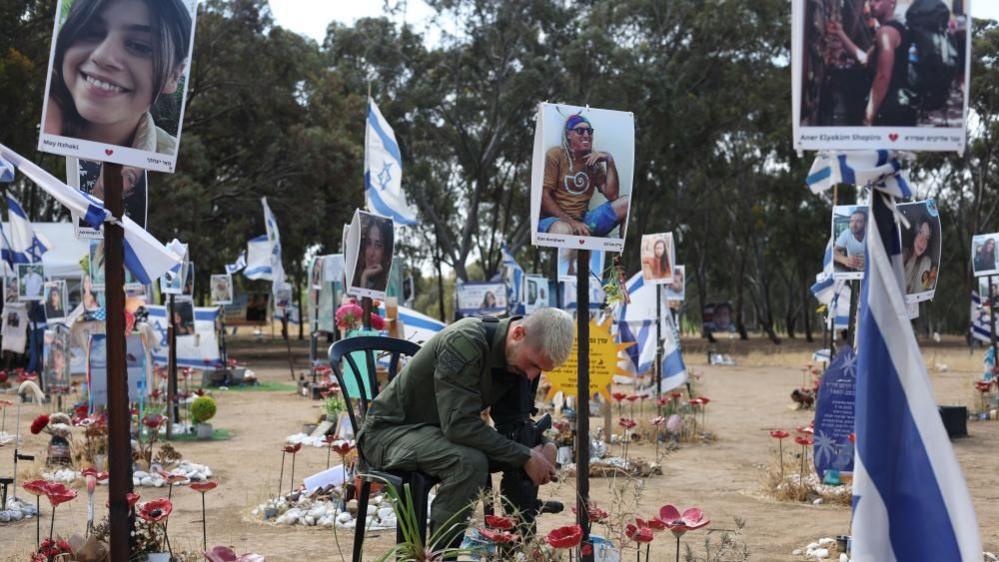ICC prosecutor seeks arrest of Israeli and Hamas leaders
ICC's Karim Khan announces arrest warrant application for Israeli and Hamas leaders
- Published
The chief prosecutor of the International Criminal Court (ICC) has applied for arrest warrants for Israeli Prime Minister Benjamin Netanyahu and Hamas's leader in Gaza, Yahya Sinwar, for war crimes.
Karim Khan KC said there were reasonable grounds to believe that both men bore criminal responsibility for war crimes and crimes against humanity from the day of Hamas's attack on Israel on 7 October onwards.
Israeli defence minister Yoav Gallant and Hamas's political leader Ismail Haniyeh, along with the group's military chief Mohammed Deif, are also wanted for arrest.
ICC judges will now decide whether they believe the evidence is sufficient to issue arrest warrants - something which could take weeks or months.

More than 35,500 people have been killed in the war, the Hamas-run health ministry says
Mr Netanyahu said in a statement that he rejected "with disgust The Hague prosecutor's comparison between democratic Israel and the mass murderers of Hamas".
US President Joe Biden described the ICC prosecutor's move as "outrageous".
Israel's foreign minister Israel Katz called the move by Mr Khan an "unrestrained frontal assault" on the victims of the 7 October attacks and a "historical disgrace that will be remembered forever".
He announced that a special command centre would be set up to fight the decision, which he said was intended to tie Israel's hands and deny it the right to self-defence.
Hamas demanded the “cancellation of all arrest warrants issued against leaders of the Palestinian resistance” and denounced what it called Mr Khan's "attempts... to equate the victim with the executioner".
The group also complained that the application for warrants against Mr Netanyahu and Mr Gallant had come “seven months late”, and that other Israeli political and military leaders had not been named alongside them.
What is the International Criminal Court?
- Published7 February
ICC prosecutor seeks arrest warrants for Netanyahu and Hamas leaders
- Published20 May 2024
Mr Khan accused the Hamas leaders of having committed crimes including extermination, murder, hostage taking, rape and sexual violence, and torture.
"The crimes against humanity charged were part of a widespread and systematic attack against the civilian population of Israel by Hamas and other armed groups," he said in a statement.
"Some of these crimes, in our assessment, continue to this day."
Hamas, he said, had inflicted "unfathomable pain through calculated cruelty and extreme callousness".
He said Israel's prime minister and defence minister were suspected of crimes including starvation of civilians as a method of warfare, murder, intentionally directing attacks against a civilian population, and extermination.
Mr Khan said his office had evidence that Israel had "intentionally and systematically deprived the civilian population in all parts of Gaza of objects indispensable to human survival".
Israel, he said, has a right to defend itself but not by "intentionally causing death, starvation, great suffering, and serious injury to body or health of the civilian population" which he said were criminal acts.

The 7 October attack by Hamas was the deadliest in Israel's history
Israeli war cabinet minister Benny Gantz - a political rival of Mr Netanyahu - denounced the prosecutor's decision.
"Drawing parallels between the leaders of a democratic country determined to defend itself from despicable terror to leaders of a bloodthirsty terror organisation is a deep distortion of justice and blatant moral bankruptcy," he said.
The accusations against the Israeli and Hamas leaders stem from the events of 7 October, when waves of Hamas gunmen attacked Israel, killing about 1,200 people and taking 252 others back to Gaza as hostages. The attack triggered the current war, in which at least 35,500 Palestinians have been killed in Gaza, according to the territory's Hamas-run health ministry.
Neither Israel nor Qatar are members of the ICC, but the Palestinian territories were admitted as a member state in 2015. In the event of warrants being issued, the ICC would rely on member countries to carry out an arrest.
No Western-style democracy has had an ICC arrest warrant issued for its leader before. Should Mr Netanyahu become the first, it will deeply alarm Israel and its allies, as well as testing the powers of limitations of the ICC.
US Secretary of State Antony Blinken also issued a statement rejecting the ICC's announcement, and said the court "has no jurisdiction over this matter" in the eyes of the US.